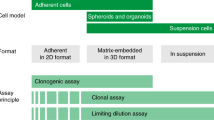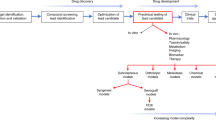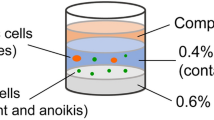Abstract
A technique for growing colonies from single-cell suspensions of human tumour xenografts using agar in diffusion chambers is described. Modified Millipore diffusion chambers containing tumour cells in semi-solid agar-medium were implanted into the peritoneal cavity of pre-irradiated mice and provided standard culture conditions for the study of colony-forming cells. All 11 xenograft tumours so far studied produced colonies. The incubation period for colony growth ranged from 12 to 28 days and the plating efficiency ranged from 0-3% to 16% for different tumours, but both parameters were constant for each individual tumour. The reproducibility of the system provides a colony-forming assay which can be used to study the effects of irradiation and cytotoxic drugs on human tumour clonogenic cells and may therefore have some advantages over similar assays based on experimental animal tumours.
This is a preview of subscription content, access via your institution
Access options
Subscribe to this journal
Receive 24 print issues and online access
$259.00 per year
only $10.79 per issue
Buy this article
- Purchase on Springer Link
- Instant access to full article PDF
Prices may be subject to local taxes which are calculated during checkout
Similar content being viewed by others
Rights and permissions
About this article
Cite this article
Smith, I., Courtenay, V. & Gordon, M. A colony-forming assay for human tumour xenografts using agar in diffusion chambers. Br J Cancer 34, 476–483 (1976). https://doi.org/10.1038/bjc.1976.201
Issue Date:
DOI: https://doi.org/10.1038/bjc.1976.201
This article is cited by
-
Inhibited methionine incorporation in human squamous carcinomas of the oral cavity as a measure for response to 5-fluorouracil
Journal of Cancer Research and Clinical Oncology (1989)
-
Predictive testing in cancer chemotherapy
Pharmaceutisch Weekblad (1985)
-
Predictive tests in cancer chemotherapy a reappraisal
Klinische Wochenschrift (1984)
-
The human tumor cloning assay in cancer drug development
Investigational New Drugs (1983)



